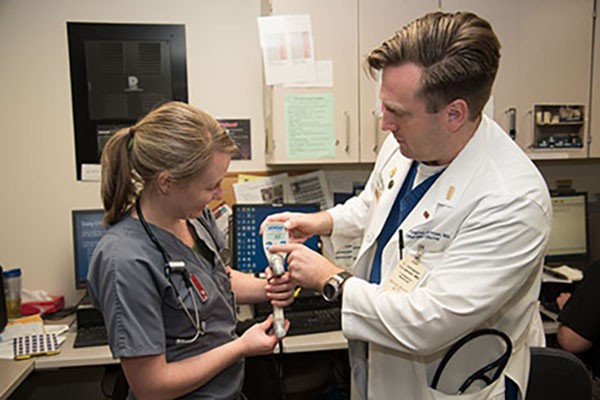Washington People: Chris Carpenter
Watching his grandparents struggle at the end of their long lives hasmotivated Chris Carpenter, MD, an associate professor of emergency medicine at Washington University School of Medicine, to work countless hours to improve emergency room care for older adults and to help create a new medical subspecialty — geriatric emergency medicine.
WashU Expert: Picking up the phone to improve mental health in seniors
A new study in JAMA Psychiatry shows that therapy provided via telephone for older adults in rural areas is effective in treating anxiety disorder. In an accompanying editorial, Eric J. Lenze, MD, of Washington University School of Medicine in St. Louis, wrote that the health-care system lacks the capacity to help the growing elderly population and that relying too heavily on sedative medications isn’t the answer.
Carpenter strives to change ER experience
Emergency physician Chris Carpenter, MD, is conducting a study of patients in the emergency room
who are older than 65 and at increased risk of having dementia. He
wants to determine if referring suspected Alzheimer’s patients to an
outreach agency will reduce frequent returns to the emergency department
and help them remain independent longer.
Quality of care varies for older adults with depression
When thinking about the well-being of older adults, most people focus on medical care, but mental health care is a growing, pressing concern for older adults and their families. “At least one in five older adults suffer from a mental disorder and experts in geriatric mental health anticipate an ‘unprecedented explosion’ of older adults with disabling mental disorder,” says Enola K. Proctor, Ph.D., mental health care expert and professor of social work at Washington University in St. Louis. “While older adults may receive adequate medical and psychiatric care, they rarely receive the care necessary to deal with the general ‘problems with living,’ or social stresses. These psychosocial problems, such as isolation and family stress, may exacerbate psychiatric problems, depression in particular, and contribute to functional decline.”
U.S. government should help ‘make volunteering a natural part of later life,’ says productive aging expert
With the first wave of baby boomers preparing for retirement, the 2005 White House Conference on Aging to be held this fall in Washington, D.C., will be an important opportunity to assess aging in America and improve the lives of older Americans. “The demographic revolution is upon us, and there is widespread agreement that we need to do something differently regarding older adults,” says Nancy Morrow-Howell, Ph.D., productive aging expert and the Ralph and Muriel Pumphrey Professor of Social Work in the George Warren Brown School of Social Work at Washington University in St. Louis. “The U.S. government and other service agencies need to expand and create institutions that make volunteering a natural part of later life,” she says.

